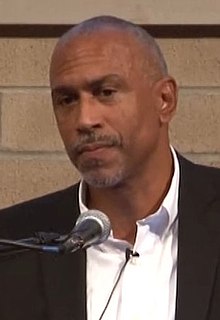A Quote by Jorge Luis Borges
The poverty of yesterday was less squalid than the poverty we purchase with our industry today. Fortunes were smaller then as well.
Related Quotes
I think people have to remember where we were in 2009. We were losing 800,000 jobs a month. We had an unemployment rate in double digits. We had poverty rates soaring. We had kids who were food insecure. Today in 2016, we have a lot less unemployment, a lot less poverty, and a lot fewer kids who are food insecure.
Those who automatically say that the social pathology of the ghetto is due to poverty discrimination and the like cannot explain why such pathology was far less prevalent in the 1950s, when poverty and discrimination were worse. But there were not nearly as many grievance mongers and race hustlers then.
One of the most durable successes of the war on poverty was to dramatically reduce the number of elderly poor in America. That's still true today. But, by contrast, child poverty has shot up over the last few years: A decade ago, about 16 percent of children in America were poor - which is a shockingly high percentage. But it's not as shocking as today, when we see that 22 percent of kids live in poverty.
We're looking at the singular condition of poverty. All the other individual problems spring from that condition... doesn't matter if it's death, aid, trade, AIDS, famine, instability, governance, corruption or war. All of that is poverty. Our problem is that everybody tries to heal each of the individual aspects of poverty, not poverty itself.
In today's world, people experience two types of poverty: the poverty caused by lack of food, clothing and shelter, and the poverty caused by lack of love and compassion. Of these two, the second type needs to be considered first because if we have love and compassion in our hearts, then we will wholeheartedly serve those who suffer from lack of food, clothing and shelter.
Poverty should be one of the top concerns for any elected leader. It has a negative effect on almost everything we as society entrust our government to do, but it seems that those in the Republican Party find it is more politically viable to fight a war on the people in poverty than it is to fight a war to end poverty in this country.
The origins of these [schooling] federal policies were tied to President Johnson's war on poverty. Supplemental funds were sent to school districts serving poor children to compensate for issues related to poverty. Since the enactment of NCLB, the focus on mitigating poverty has been replaced by a focus on accountability as measured by test scores.
Poverty is a strange and elusive thing. ... I condemn poverty and I advocate it; poverty is simple and complex at once; it is a social phenomenon and a personal matter. Poverty is an elusive thing, and a paradoxical one. We need always to be thinking and writing about it, for if we are not among its victims its reality fades from us. We must talk about poverty because people insulated by their own comfort lose sight of it.






































